Glimpses of India Explanation, Line by Line, Meaning of Difficult Words, English CBSE Class 10 NCERT First Flight Chapter 7
GLIMPSES OF INDIA
(Explanation and Meaning of difficult words)
I
A BAKER FROM GOA
Author – Lucio Rodrigues


| Word | Meaning |
| Reminiscing nostalgically | Thinking fondly about past |
| Portuguese | Of Portugal country |
| Loaves of bread | Big pieces of bread before slicing |
Our elders many times fondly talk about nice period of earlier time when people from Portugal were rulers of Goa. They also talk about Portuguese people and big pieces of bread made during those days. [Loaves is plural form of loaf]


| Word | Meaning |
| Vanished | Disappeared |
| Mixers | One who mixed floor for bread |
| Moulder | One who moulds dough for bread |
People who used to eat loaves of bread may have now disappeared. [Meaning that nowadays people do not eat loaves of bread]. But people who used to make bread still live in Goa. People who used to mix floor, mould dough and make loaves still live in Goa.


| Word | Meaning |
| Age old | Very old |
| Time tested | Used since long period |
| Extinguished | Stopped, Put out |
Very old furnaces are still being used since very long time. These furnaces are still in working condition.


| Word | Meaning |
| Thud | A sudden heavy sound |
| Jingle | A musical sound |
| Heralding | Announcing |
The sudden heavy sound and the musical sound made by the bamboos of the traditional baker used to announce his arrival. Such sounds can still be heard in some places of Goa. [Meaning that tradition of bakers is prevailing in some parts of Goa]


| Word | Meaning |
| Carries on | Continues |
Probably the elders who used to make loaves are not alive now. But the next generation of youngsters are continuing the family profession of making bread. These baker are called ‘pader’ in Goa.
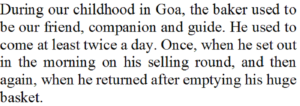

| Word | Meaning |
| Companion | Colleague |
| Set out | To start |
When we were children, the baker was our friend, colleague and guide. He used to come to our house at least twice in a day. In the morning he used come at the start of his morning round to sell bread. And he also used to come after selling all the breads. His big basket used to be empty at that time.


We woke up from our sleep by the thud and jingling of bamboos of bakers. We used to run out of our house to meet and welcome him. We did not run out because we liked loaves of bread.


| Word | Meaning |
| Longed | Desired, Wanted |
| Bread-bangles | Bread in the form of bangles |
The loaves of bread used to be bought by our maid servants. Their surname used to be Paskine or Bastine. We wanted to buy bread which was in the shape of bangles. Sometimes baker used to bring especially made sweet bread.


| Word | Meaning |
| Staff | A long pole |
| Bang | To hit |
The baker announced his arrival by the musical sound made by his long bamboo stick. His one hand supported the basket on his head. He hit his bamboo staff on the ground by the other hand.


| Word | Meaning |
| Pushed aside | Asked to go, Pushed away |
| Rebuke | Scold |
The baker used to say ‘Good morning’ to lady owner of the house. He would then put his basket on the bamboo. We kids used to gather around the scene. But we were given a mild scolding and asked to go away. The loaves of bread were given to the servants of the house.


| Word | Meaning |
| Peep into | Look into |
| Give up | To stop trying |
| Typical | Of a particular type, Usual |
| Fragrance | Smell |
But we would keep on trying. We would climb on a bench or a parapet to somehow look into the basket. I can recall the special fragrance of those loaves. The loaves were for the elders and bread-bangles were for children.
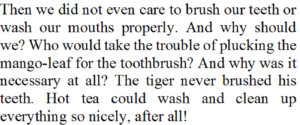

We did not bother to brush our teeth or wash our mouth. We did not want to take the trouble of plucking mango leaves for brushing our teeth. We kids used to think why brushing of teeth is necessary. The tiger never brushes its teeth. Hot tea can wash and clean all our teeth very nicely.


| Word | Meaning |
| Charm | Delight, Attraction |
| Feast | Special meal for gathering of people |
Marriage gifts were considered incomplete without sweet bread known as ‘bol’. [Meaning that marriage gifts always included sweet bread] Every party had bread as one of the food items. It is not possible to write everything to prove that baker was very important to a village.
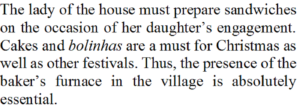

It was necessary to prepare sandwiches on the occasion of engagement of a daughter. Cakes and ‘bolinhas’ was necessary on Christmas and other festivals. Therefore it was very necessary to have a baker in every village.
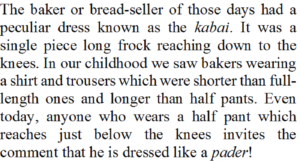

| Word | Meaning |
| Peculiar | Strange |
The baker of those days used to wear a strange dress known as ‘kabai’. This dress was a frock which used to reach upto the knees. In our childhood days, bakers had started wearing a shirt and trousers. These trousers used to reach upto just below the knees. Even today if anyone wears such trousers, it is said that he is wearing dress of a pader.


| Word | Meaning |
| Starved | To remain hungry or die of hunger |
The baker normally used to collect money at the end of the month. The record of monthly purchases used to be written by pencil on a wall. During those days baking was a profitable profession. The baker and his family were never hungry. [Meaning he could meet needs of his family]


| Word | Meaning |
| Prosperous | Rich |
| Testimony | Evidence, Proof |
| Jack fruit like physique | Round fat body |
The baker, his family and his servants all looked happy and rich. Their round body was proof of this. Even today, anybody having round fat body is called a baker.
****
II
COORG
(Explanation)
Author – Lokesh Abrol


| Word | Meaning |
| Coastal town | Town near sea shore |
| Drifted | Came, Moved |
Mangalore is town situated near the shore of sea, hence it called a coastal town.
Nearly at half the distance between Mysore and Mangalore, there is a piece of land that can be called heaven. It is so beautiful that probably it has come to earth from the kingdom of God.


| Word | Meaning |
| Rolling hills | Series of hills of low height |
| Inhabited | Lived by, Settled |
| Martial | Related to fighting abilities |
This land has many hills of low heights. In this area beautiful women, several wild creature and men who are proud of their fighting abilities live. People of this area are brave.


| Word | Meaning |
| Evergreen | Always green, Always lively |
| Plantation | Area where trees are planted |
Coorg or Kodagu is the smallest district of Karnataka. Rainforests which are always green, plantations of spices and coffee exist in this area. Thirty percent area of this district is covered by evergreen rainforests.


| Word | Meaning |
| Commences | Starts |
| Showers | Light rains |
| In for good measure | Extra, Additionally |
During monsoon season it rains heavily. So visitors do not come in this season. The season of happiness starts from September and continues up to March. Weather during this period is very good. Occasionally it rains in this period also.


| Word | Meaning |
| Invigorating | Fresh, Healthy |
| Estate | Big garden |
| Colonial | Of British period |
| Prime | Important, Valuable |
The air has smell of fresh coffee. Big gardens of coffee exist in this area. Bungalows of British period under trees are situated at important location.


| Word | Meaning |
| Fiercely | Strongly, Extremely |
| Descent | Originally, Ancestors |
| Impractical | Not practical |
Extremely independent people of Coorg are probably originally from Greece or Arab. According to a story, some people from army of Alexander had come to the southern part of India along the sea. Then they settled in Coorg because going back to Greece was not practical.


| Word | Meaning |
| Apparent | Visible, Clear |
| Rites | Rituals, Methods |
| Distinct | Different |
| Mainstream | Majority |
Later these people married among local residents of this area. Their culture can be seen in the way they fight, their rituals of marriage and religious methods. These are different from traditions of Hindus of this area.


| Word | Meaning |
| Waist-belt | Belt worn at waist |
| Arabs | People originally from Arab |
| Kurds | People originally from Kurd |
The theory that these people are originally from Arab is supported because they wear a black coat with a waist belt. This belt has embroidery. It is known as ‘kuppia’. This belt is similar to ‘kuffia’ worn by people of Arab and Kurd.


| Word | Meaning |
| Coorgi | Belonging to Coorg |
| Hospitality | Being a host |
| More than willing | Always eager |
| Recount | Narrate, Describe |
| Numerous | Several, Many |
| Valour | Bravery |
People of Coorg have a tradition of being a good host. They are always eager to narrate several stories of bravery of their sons and fathers.
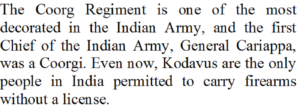

Soldiers of Coorg Regiment of Indian Army have won the highest numbers of medals for bravery. The first Chief of Indian Army, General Cariappa was from Coorg. Even nowadays, people from Coorg are the only people in India, who are allowed to carry firearms without a license.
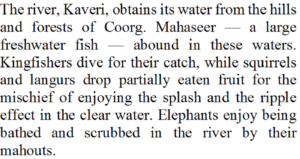

| Word | Meaning |
| Kingfisher | Type of bird |
| Abound | Present in large numbers |
| Bathe | To take bath |
| Scrub | Rub |
| Mahout | One who drives elephant |
Water from hills and forests of Coorg come to Kaveri river. Mahaseer is a type of big freshwater fish. It is found in large quantity in Kaveri river. Kingfishers dive in the river to catch their prey. Squirrels and langurs throw half eaten fruits into the river. They enjoy the splash created by this activity. Mahouts bathe and rub skin of their elephants in the river.


| Word | Meaning |
| Laidback | Lazy, Casual |
| Trails | Tract |
| Trekkers | One who makes long journey on foot |
The most lazy individuals will start enjoying highly adventurous sports like river rafting, canoeing, rappelling, rock climbing and mountain biking. Several tracts or zones of walking of this area are favourites of walkers.


While walking, one would notice bees and butterflies. Several animals would be sitting on top of tress and watching you. I like to move to the side if a wild elephant comes on the walking trail.


| Word | Meaning |
| Panoramic view | Broad or wide view |
| Misty | Full of fog |
| Landscape | Area, Topography |
From the top of Brahmagiri hills you can have a broad view of the total area of Coorg. The entire area would look covered with fog.


| Word | Meaning |
| Running into | Meeting, Coming across |
| Bonus | Additional advantage |
After crossing the rope bridge one reaches the island of Nisargadham. Area of this island is sixty four acres. India’s largest settlement of Tibetans is situated in nearby Bylakupp. Meeting Budhists monk there is an additional advantage.


| Word | Meaning |
| Ochre | Golden yellow or golden brown |
| Robes | Dresses |
These monks wear, red, golden brown and yellow dresses. Visitor who come to Coorg in search of peace would be surprisingly happy to have a good discussion with monks.
****
III
TEA FROM ASSAM
(Explanation)
Author – Arup Kumar Datta


| Word | Meaning |
| Vendor | Seller |
The story begins with people travelling in a train. A loud voice from a tea seller request people to buy hot tea. He comes up to the window of the compartment and asks if anybody wants to buy tea. Prajol asked him to give two cups of tea.
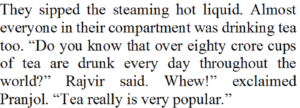

| Word | Meaning |
| Sip | Drink slowly |
| Steaming hot | Very hot |
| Over | More than |
They started drinking the hot tea slowly. Steam was coming out of tea. Almost everybody in the compartment was drinking tea. Rajvir said that more than eight crore people drink tea every day in the world. Pranjol said that tea is certainly very popular.


| Word | Meaning |
| Ardent fan | Passionate, Liked too much |
| Keener | More interested |
The train started moving and came out of the platform. Pranjol once again started reading his detective novel. Rajvir was also passionate about reading detective stories. But at present he was more interested in looking at the beautiful scenery through window of the train.


| Word | Meaning |
| Paddy field | Field of rice |
He saw through the window of the train that it was green everywhere. Rajvir had never seen so much of greenery before. Earlier there were fields of rice outside the train. The train moved ahead. Now through the window he saw bushes of tea.


| Word | Meaning |
| Magnificent | Extremely beautiful |
| Densely wooded | Closely grown trees |
It was an extremely beautiful view. In the front there were tea bushes as far as one could see. Behind these bushes one could see hills. Trees on hills were very close to each other, thus looked dense.


| Word | Meaning |
| Dwarf | Of small height |
| Tiny | Very small |
| Sturdy | Strong |
| Amidst | Among |
| Orderly | Nicely arranged |
In the field there were tall and strong trees also. The tea bushes looked very small in comparison to these trees. Among the nicely arranged rows of tea bushes some people were moving. Those people looked like dolls.


| Word | Meaning |
| Billowing | Flowing out, Coming out |
Far away an ugly building could be seen. Smoke was coming out of tall chimneys. Rajvir shouted in excitement that it was a tea garden. Pranjol has been seeing tea gardens since his childhood. Therefore he was not exited to look at tea gardens.


Rajvir exclaimed that the whole of the area was a tree garden. Assam has most number of tea gardens in the world. There are so many tea gardens in Assam that one cannot see all of these even in his entire lifetime.


Rajvir said that he had been reading about tea as much as possible. No one knows who discovered tea but there are many stories about it. Prajol asked what these stories were.
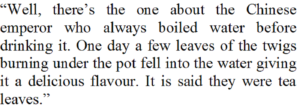

| Word | Meaning |
| Twig | Small branch of a tree |
| Delicious | Very tasty |
| Flavour | Taste |
Once there was a king in China. He always used to drink boiled water. One day a few leaves of a small branch fell into the boiling water. The twig was being used a firewood to boil water. Because of those leaves taste of water became very tasty. It is said that those were tea leaves.


| Word | Meaning |
| Scoffed | Teased, Teasingly |
| Ascetic | Monk |
Teasingly Pranjol asked to tell another story. Rajvir said there is another story from India also. Bodhidharma was an ancient Buddhist monk. He felt sleepy while doing his prayers. So he cut his eyelids and threw these on the ground.


| Word | Meaning |
| Banish | Send away, Expel |
From these eyelids ten tea plants grew. When leaves of these plants were put in hot water and that water was drunk, sleep did not come to the person.
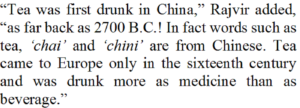

| Word | Meaning |
| Beverage | Liquid drink for refreshment |
Rajvir further said that tea was first consumed in China long ago in 2700 BC. Actually words like ‘tea’, ‘chai’ and ‘chini’ are from Chinese language. Tea came to Europe in 16th century. Initially tea was consumed as medicine not as a refreshment drink.


| Word | Meaning |
| Clattered | With lot of sound |
| Crowded | Having a crowd |
With lot of sound the train reached Mariani junction. The two boys picked their luggage and got down to the platform. The platform was crowded. Parents of Pranjol were waiting at the platform for them.


| Word | Meaning |
| Veered | Took a sharp turn |
| Cattle bridge | A bridge that cattle cannot cross |
| Estate | Large area, Property |
Soon they were travelling in a car to Dhekiabari. Father of Pranjol was manager of this tea garden. After one hour the car took a sharp turn from the main road. They crossed a cattle- bridge and entered the area of Dhekiabari Tea Estate.


| Word | Meaning |
| Gravel | Small stones, Pebbles |
| Acre upon acre | Very large area |
| Prune | To cut |
| Pluck | Pull , Pick |
| Sprouted | Grown, Developed |
The road was made of small stones. On both sides of road, there were very large areas of tea garden. Tea bushes were nicely cut to the same height. There were many groups of people who were pulling and picking tea leaves from bushes. They had a basket made of bamboo on their back. They were wearing plastic apron. They were picking the newly grown tea leaves.


Father of Pranjol slowed his vehicle to allow a tractor to cross their vehicle. The tractor was pulling a trolley which was full of tea leaves. Mr. Barua is father of Pranjol. Rajvir asked Mr. Barua if it was the second season of the year for tea leaves to grow. This season starts in May and ends in July. During this period best tea leaves grow on tea bushes.


| Word | Meaning |
| Admitted | Agreed |
Pranjol’s father was surprised to hear these details from Rajvir. He said to Rajavir that it looked Rajvir had studied about tea gardens before coming there. Rajvir agreed and said that he hoped to learn more while he was at the tea garden.
****
THE TREES
(Explanation)
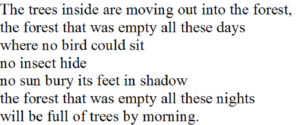

| Poetic Devices | |
| the forest that was empty all these days | Alliteration |
| no bird could sit no bird could hide | Repetition |
| no sun burry its feet in shadow | Personification |
The trees inside the house are growing and their growth is moving out of the house into the forest. The forest had been without trees nowadays. Since there were no trees in the forest, birds could not sit on trees. Insects could not hide. During daytime, there was no shadow. The forest that was without trees since many nights, will now be full of trees by the morning.
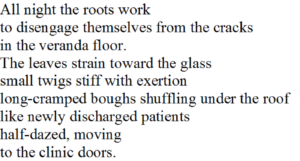

| Word | Meaning |
| Disengage | To separate |
| Strain | To make efforts |
| Twig | Small branch of a tree |
| Stiff | Rigid, Inelastic |
| Exertion | Tiredness |
| Cramped | Restricted |
| Bough | Big branch of a tree |
| Shuffling | Moving with sound |
| Dazed | Confused, Surprised |
| Clinic | Hospital |
| Poetic Devices | |
| the small twigs with exertion | Metaphor |
| like newly discharged patients | Simile |
During night time, roots of the trees are trying to grow and come out of the floor of veranda. Leaves and small branches of tree are pushing against glass panes of window. Small branches have become rigid because of tiredness. Movement of the long and big branches is restricted because of ceiling. The longer branches of trees are moving along the ceiling. Their movement is similar to that of a patient who has been discharged from a hospital and moves towards exit door of the hospital in a state of confusion.
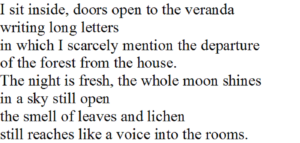

| Word | Meaning |
| Scarcely | Hardly |
| Lichen | Small plant that grows on tree |
| Poetic Devices | |
| writing long letters | Alliteration |
| of the forest from the house | Alliteration |
| in a sky still open | Alliteration |
| the smell of leaves and lichen | Alliteration |
| still reaches like a voice | Simile |
I am sitting inside the room, whose door opens into the veranda. I am writing long letters. In these letters I do not mention anything about trees going out of my house into the forest. The night appears to be fresh and full moon is shining. The sky is clear without any clouds. I can smell leaves and lichen very clearly. The poet is equating this smell to voice of trees that are trying to move out of the house.
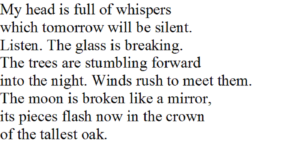

| Word | Meaning |
| Whisper | Murmur, Speak in low sound |
| Stumbling | Fall after tripping |
| Rush | To move speedily |
| Flash | Shine |
| Oak | A type of tree |
| Poetic Devices | |
| which tomorrow will be silent | Alliteration |
| The moon is broken like a mirror | Simile |
| of the tallest oak | Alliteration |
I can listen to the low voice made by trees that are trying to move out of the house. After the trees have moved out, there will be silence. Now the glass is breaking. I can listen to the sound. The trees slowly move out of the window. Wind moves quickly to meet these trees. Because of trees, the moon cannot be seen completely. The poet says that the moon now looks like a several pieces of a broken glass. These broken pieces can be seen at top of the longest oak tree.
One more view of explaining the poem
The trees can be seen as human beings, particularly women and young children. Lot of restriction were imposed on them. But now they have grown up and they are trying to move out of the restrictions. They are trying to find a world of their own.
****




1 Comment
Aaru sahu · December 24, 2021 at 1:28 pm
Thank you so much this is really helpfull for me